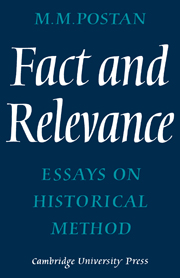Book contents
- Frontmatter
- Contents
- Acknowledgments
- Preface
- 1 Reason in social study
- 2 History and the social sciences
- 3 The historical method in social science
- 4 Function and dialectic in economic history
- 5 Fact and relevance in historical study
- 6 Economic and social history
- 7 Economic growth
- 8 A plague of economists?
- 9 The uses and abuses of economics
- 10 Agriculture and economic development: a lesson of history
- 11 Technological progress in post-war Europe
- 12 A study of history
- 13 Karl Marx: a democrat?
- 14 Hugh Gaitskell: political and intellectual progress
- Index
8 - A plague of economists?
Published online by Cambridge University Press: 07 October 2011
- Frontmatter
- Contents
- Acknowledgments
- Preface
- 1 Reason in social study
- 2 History and the social sciences
- 3 The historical method in social science
- 4 Function and dialectic in economic history
- 5 Fact and relevance in historical study
- 6 Economic and social history
- 7 Economic growth
- 8 A plague of economists?
- 9 The uses and abuses of economics
- 10 Agriculture and economic development: a lesson of history
- 11 Technological progress in post-war Europe
- 12 A study of history
- 13 Karl Marx: a democrat?
- 14 Hugh Gaitskell: political and intellectual progress
- Index
Summary
Inquisitions by economists and economic journalists into Britain's predicament are in no danger of running out of indictable culprits. The Trade Unions, the working class as a whole, the Chancellor of the Exchequer, the Bank of England, the international monetary authorities, and, of course, Harold Wilson, each of them separately and all of them in combination have been named as the guilty ones. At no time, however, has any guilt been imputed to the inquisitors themselves, the economists of England. Yet on any impartial allocation of blame a share must attach to the economic experts.
It is not that the quality of British economics, or economists, has sunk and now stands lower than in the past or than in other, less afflicted, countries. On the contrary, judged by the numbers of its professional practitioners and its lay addicts, economics was never more flourishing. The voice of academic economists was never louder and was never heard with greater awe. Nor is there much wrong about the quality of the economists themselves. In recent years Cambridge may have yielded the leadership in pure theory to MIT, Stanford, or Chicago, but the University which still boasts of Joan Robinson, Nicholas Kaldor, J. R. N. Stone, Piero Sraffa, and a multitude of gifted youngsters, has every right to be as immodest about its intellectual standing as it apparently is. The same is to a large extent true of the reconstructed Department of Economics at LSE or of Oxford or Colchester. It is also true of the intellectual quality of the economists in government service.
- Type
- Chapter
- Information
- Fact and RelevanceEssays on Historical Method, pp. 80 - 91Publisher: Cambridge University PressPrint publication year: 1971



